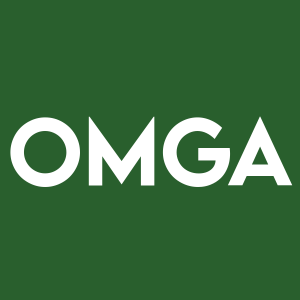Omega Therapeutics Announces Successful Completion of Phase 1 Trial for Novel Epigenomic Controller, Prioritized Pipeline, Leadership Changes, and Third Quarter 2024 Financial Results
Rhea-AI Summary
Omega Therapeutics announced key updates including successful completion of Phase 1 MYCHELANGELO™ I trial for c-MYC in HCC, demonstrating clinical proof-of-mechanism for epigenomic controllers. The company appointed Kaan Certel as CEO and Jennifer Nelson as CSO, while prioritizing three key programs in obesity, regenerative medicine, and metabolics. Financial results show cash position of $30.4 million expected to fund operations into Q2 2025, with Q3 2024 net loss of $16.4 million, decreased from $22.2 million in Q3 2023. The company is actively seeking strategic partnerships for pipeline advancement.
Positive
- Phase 1 MYCHELANGELO trial showed 50% disease control rate in HCC patients
- Reduced net loss to $16.4M in Q3 2024 from $22.2M in Q3 2023
- R&D expenses decreased by $3.7M compared to Q3 2023
- G&A expenses reduced by $1.0M compared to Q3 2023
- Ongoing collaboration with Novo Nordisk for obesity program
Negative
- $30.4M cash runway only extends into Q2 2025
- Deprioritization of OTX-2101 and CXCL1-8 programs
- Phase 2 development of OTX-2002 dependent on finding strategic partners
News Market Reaction 1 Alert
On the day this news was published, OMGA declined 17.98%, reflecting a significant negative market reaction.
Data tracked by StockTitan Argus on the day of publication.
- Established clinical proof-of-mechanism and validation of epigenomic controllers as potential new class of medicines from completed Phase 1 MYCHELANGELO™ I trial for c-MYC in HCC; Company exploring strategic partnership opportunities for Phase 2 development of OTX-2002
- Company is focusing capital resources on three prioritized programs that reflect Omega’s unique value proposition to enable precision epigenomic control for potential therapeutic advantages versus existing modalities
- Board has appointed Kaan Certel, Ph.D., as Omega’s President and Chief Executive Officer, and Jennifer Nelson, Ph.D., as Chief Scientific Officer
- Company is pursuing strategic partnership opportunities to support development of new and existing pipeline programs; collaboration with Novo Nordisk for development of an epigenomic controller for obesity continues to advance
CAMBRIDGE, Mass., Nov. 14, 2024 (GLOBE NEWSWIRE) -- Omega Therapeutics, Inc. (Nasdaq: OMGA) (“Omega”), a biotechnology company pioneering the development of a new class of programmable epigenomic medicines, today announced financial results for the quarter ended September 30, 2024 and multiple strategic and leadership updates, including the appointment of Kaan Certel, Ph.D., an industry veteran with extensive experience in corporate strategy and business development, as Chief Executive Officer. Dr. Certel succeeds Mahesh Karande as CEO, who has decided to leave Omega for personal reasons. In addition, the Company shared updated clinical data from the Phase 1 MYCHELANGELO™ I clinical trial and a strategic prioritization of its pipeline to focus resources on programs in which the Company believes epigenomic controllers have the potential to demonstrate therapeutic advantages over existing modalities, address significant unmet needs and unlock rapid value creation.
“Kaan Certel has demonstrated outstanding business and scientific leadership as our Chief Business Officer since joining Omega earlier this year. We are excited to welcome him to his new role as Omega’s Chief Executive Officer,” said Chris Schade, Chairman of the Board of Directors of Omega Therapeutics. “His deep scientific expertise and strong track record of driving strategic partnerships will be invaluable as we advance our pipeline of impactful programs and expand our business development efforts. On behalf of the entire board, I want to extend our sincere gratitude to Mahesh for his efforts in establishing a strong foundation for Omega and advancing epigenomic controllers to clinical proof-of-mechanism.”
“I am excited to work with the board and our team to build on the progress Omega has made harnessing the power of epigenomic controllers. The compelling data that we have generated both clinically and pre-clinically gives us greater confidence in the potential of programmable epigenomic medicines to address a broad range of diseases,” said Kaan Certel, Ph.D., President and Chief Executive Officer of Omega Therapeutics. “The industry-first data from our recently completed, first-in-human clinical trial provide clear proof-of-mechanism, having demonstrated highly specific, on-target engagement with the intended epigenomic state change. We believe these data validate epigenomic controllers as a potential new class of medicines. In parallel, we have deepened our technical capabilities with a focus on upregulation and exquisite multiplexed control, which we believe may hold therapeutic advantages over existing modalities.”
Dr. Certel continued, “Together with our new Chief Scientific Officer, Jennifer Nelson, Ph.D., we are focusing our pipeline on three programs with significant opportunities in obesity, regenerative medicine and metabolic indications that fully leverage our unique value proposition in epigenomic modulation. Going forward, we plan to focus our resources on these prioritized programs and on cultivating strategic partnerships to advance existing and new development candidates as a core component of our corporate strategy. We are actively engaged in ongoing dialogue with potential partners to further support and expand our pipeline in an accelerated and capital-efficient manner.”
Prioritized Pipeline
Omega is prioritizing select preclinical programs in three areas where precision epigenomic control offers clear potential therapeutic advantages over existing modalities, including trans-differentiation for cellular reprogramming and durable upregulation of gene expression of intracellular proteins or secreted proteins where naturally occurring protein production may offer advantages over traditional biologics. Program advancement will be disciplined and data-driven to maximize shareholder value, capital efficiency and strategic partnering opportunities.
Obesity
- In collaboration with Novo Nordisk, Omega continues to advance the development of an epigenomic controller for obesity. This program leverages Omega’s platform capabilities in trans-differentiation to transition the epigenetic state of white adipose cells to metabolically active brown adipose cells, with the goal of enhancing metabolic activity as a part of a potential new treatment approach for obesity management.
Regenerative Medicine
- HNF4A: Multiple liver diseases such as MASH (metabolic dysfunction-associated steatohepatitis) are characterized by fibrosis secondary to chronic inflammation. HNF4A is a nuclear receptor and master regulator of liver development and function. Upregulation of the HNF4A gene holds the potential to mitigate fibrosis and restore liver function. Omega has generated in vitro and in vivo data demonstrating the ability of epigenomic controllers to significantly upregulate HNF4A gene expression and reduce key measures of fibrosis.
Metabolic
- FGF21: A hormone involved in multiple metabolic processes, FGF21 has been implicated in hyperlipidemia and obesity. Well established preclinical models have demonstrated clear translatability to clinical studies and provide an opportunity to rapidly advance candidates to clinical proof-of-concept studies. Upregulation of FGF21 through precision epigenomic control may offer a compelling approach to address multiple metabolic indications where upregulation of natural protein expression cannot be mimicked by existing modalities.
Other Programs
- The Phase 1 MYCHELANGELO trial of OTX-2002 has been completed and the Company is engaged in discussions with potential partners to further advance clinical development into Phase 2 or may choose to resume development through internal efforts with additional funding.
- The OTX-2101 and CXCL1-8 programs have been deprioritized in order to focus resources and capital on the three selected programs described above. The Company is pursuing strategic partnership opportunities to advance these programs or may choose to resume development through internal efforts with additional funding.
“Our prioritized pipeline leverages the differentiated capabilities of our platform and reflects the diverse potential applications of Omega’s technology. We are excited by the opportunity to demonstrate the power of precision epigenomic control in these select high-value programs and build on the clinical progress we have made,” said Jennifer Nelson, Ph.D., Chief Scientific Officer of Omega Therapeutics. “Our first-in-human study clearly demonstrated our ability to prospectively design an epigenomic controller capable of inducing prespecified changes in epigenetic signatures that alter gene expression with high specificity. Expanding on these results, we have an incredible opportunity to establish epigenomic controllers as a new class of medicines with unparalleled versatility.”
Topline Data from Completed Phase 1 MYCHELANGELO™ Trial
The Phase 1 monotherapy dose escalation portion of MYCHELANGELO I was designed to evaluate the safety, tolerability, pharmacokinetics, pharmacodynamics, and preliminary anti-tumor activity of OTX-2002 in patients with relapsed or refractory hepatocellular carcinoma (HCC) and other solid tumor types known for association with the MYC oncogene.
Twenty-four patients, including 19 with HCC, were enrolled across six dose cohorts (spanning 0.02 mg/kg to 0.3 mg/kg) and were treated with OTX-2002 intravenously once every two weeks.
Topline data from the completed Phase 1 trial showed:
- Pharmacodynamics and pharmacokinetics:
- Highly specific on-target engagement with intended epigenetic changes at the target genomic loci, as evidenced by a robust increase in cell-free DNA MYC methylation signal following administration of study drug. The signal was dose dependent within the tolerated dose range. Pre-dose levels of MYC methylation were non-detectable. The increased methylation signal persisted throughout the two-week dosing interval and downregulation of MYC expression was observed.
- Predictable and consistent pharmacokinetics profile with rapid clearance, minimal variability observed within and between patients, and no accumulation observed with repeat administration.
- Safety and tolerability:
- At the recommended dose for expansion (0.12 mg/kg), OTX-2002 showed a favorable safety profile, with infusion-related reactions being the most common adverse event, generally consistent with the known profile of other FDA-approved LNP-delivered therapeutics.
- Preliminary clinical activity in HCC:
- The observed disease control rate (DCR) for response-evaluable HCC patients was
50% , with a best overall response of stable disease. This DCR is in-line with the historical benchmark range for completed Phase 1 trials for approved TKIs and PD-1 monotherapies in HCC (29-65% ).
- The observed disease control rate (DCR) for response-evaluable HCC patients was
The Company plans to present the Phase 1 dataset at an upcoming scientific conference.
Corporate Updates
The Board of Directors has appointed Kaan Certel, Ph.D., as Omega’s Chief Executive Officer, and Jennifer Nelson, Ph.D., as Chief Scientific Officer.
- Dr. Certel is a recognized leader with over 20 years of experience in the biopharmaceutical industry and academia with a track record of successfully driving strategic partnerships, corporate development, growth and innovation in the biopharmaceutical industry. He was previously Chief Business Officer at Omega and before that served as Chief Business Officer at BioCity Biopharma and Head of Oncology External Innovation at Sanofi.
- Dr. Nelson was Omega’s Senior Vice President of Research and, prior to that, was Vice President of Research at Flagship Pioneering, where she helped launch and develop bio-platform companies. She has previously served as Head of Vaccines at Laronde and played a leading role in advancing novel approaches to leveraging mRNA for therapeutic purposes at Moderna Therapeutics.
An updated corporate presentation is available on the Investors section of the Company’s website at https://ir.omegatherapeutics.com/.
Third Quarter 2024 Financial Results
As of September 30, 2024, the Company had cash and cash equivalents totaling
Research and development (R&D) expenses for the third quarter of 2024 were
General and administrative (G&A) expenses for the third quarter of 2024 were
Net loss for the third quarter of 2024 was
About Omega Therapeutics
Omega Therapeutics is a biotechnology company pioneering the development of a new class of programmable epigenomic medicines to treat or cure a broad range of diseases. By pre-transcriptionally modulating gene expression, Omega’s approach enables precision epigenomic control of nearly all human genes, without altering native nucleic acid sequences. Founded in 2017 by Flagship Pioneering following breakthrough research by world-renowned experts in the field of epigenetics, Omega is led by a seasoned and accomplished leadership team with a track record of innovation and operational excellence. The Company is committed to revolutionizing genomic medicine and has a pipeline of therapeutic candidates derived from its OMEGA platform.
For more information, visit omegatherapeutics.com, or follow us on X and LinkedIn.
About the OMEGA Platform
The OMEGA platform leverages the Company’s deep understanding of gene regulation, genomic architecture and epigenetic mechanisms to design a potential new class of programmable epigenomic medicines that precisely target and modulate gene expression at the pre-transcriptional level. Combining world-class data science capabilities with rational drug design and customized delivery, the OMEGA platform enables control of fundamental epigenetic processes and reprogramming of cellular physiology to address the root cause of disease. Omega’s modular and programmable mRNA medicines, called epigenomic controllers, target specific genomic loci within insulated genomic domains with high specificity to durably tune single or multiple genes to treat and cure diseases through unprecedented precision epigenomic control.
Forward-Looking Statements
This press release contains forward-looking statements within the meaning of the Private Securities Litigation Reform Act of 1995. All statements contained in this press release that do not relate to matters of historical fact should be considered forward-looking statements, including, without limitation, statements regarding: potential strategic partnership opportunities; our prioritization of certain preclinical programs and platform efforts; the potential of the OMEGA platform to engineer programmable epigenomic mRNA therapeutics that successfully regulate gene expression by targeting insulated genomic domains; expectations regarding our recent leadership changes and the potential of our product candidates and programs; expectations regarding our pipeline, including the advancement of multiple preclinical development programs in obesity, regenerative medicine and metabolic conditions; potential partnership opportunities; our anticipated cash runway into the second quarter of 2025; and our participation in upcoming events and presentations. These statements are neither promises nor guarantees, but involve known and unknown risks, uncertainties and other important factors that may cause our actual results, performance or achievements to be materially different from any future results, performance or achievements expressed or implied by the forward-looking statements, including, but not limited to, the following: the novel technology on which our product candidates are based makes it difficult to predict the time and cost of preclinical and clinical development and subsequently obtaining regulatory approval, if at all; the substantial development and regulatory risks associated with epigenomic controllers due to the novel and unprecedented nature of this new category of medicines; our limited operating history; the incurrence of significant losses and the fact that we expect to continue to incur significant additional losses for the foreseeable future; our need for substantial additional financing; volatility in capital markets and general economic conditions; our investments in research and development efforts that further enhance the OMEGA platform, and their impact on our results; uncertainty regarding preclinical development, especially for a new class of medicines such as epigenomic controllers; potential delays in and unforeseen costs arising from our clinical trials; the fact that our product candidates may be associated with serious adverse events, undesirable side effects or have other properties that could halt their regulatory development, prevent their regulatory approval, limit their commercial potential, or result in significant negative consequences; difficulties manufacturing the novel technology on which our epigenomic controller candidates are based; our ability to adapt to rapid and significant technological change; our reliance on third parties for the manufacture of materials; our ability to successfully acquire and establish our own manufacturing facilities and infrastructure; our reliance on a limited number of suppliers for lipid excipients used in our product candidates; our ability to advance our product candidates to clinical development; and our ability to obtain, maintain, enforce and adequately protect our intellectual property rights. These and other important factors discussed under the caption “Risk Factors” in our Quarterly Report on Form 10-Q for the quarter ended September 30, 2024, and our other filings with the SEC, could cause actual results to differ materially from those indicated by the forward-looking statements made in this press release. Any such forward-looking statements represent management’s estimates as of the date of this press release. While we may elect to update such forward-looking statements at some point in the future, we disclaim any obligation to do so, even if subsequent events cause our views to change.
| Omega Therapeutics, Inc. Consolidated statements of operations and comprehensive loss (Unaudited, In thousands except share and per share data) | |||||||||||||||
| Three Months Ended September 30, | Nine Months Ended September 30, | ||||||||||||||
| 2024 | 2023 | 2024 | 2023 | ||||||||||||
| Collaboration revenue | $ | 2,612 | $ | 831 | $ | 7,106 | $ | 2,105 | |||||||
| Operating expenses: | |||||||||||||||
| Research and development | 12,807 | 16,506 | 41,162 | 61,638 | |||||||||||
| General and administrative | 6,225 | 7,228 | 19,395 | 20,029 | |||||||||||
| Total operating expenses | 19,032 | 23,734 | 60,557 | 81,667 | |||||||||||
| Loss from operations | (16,420 | ) | (22,903 | ) | (53,451 | ) | (79,562 | ) | |||||||
| Other income (expense), net: | |||||||||||||||
| Interest income, net | 14 | 684 | 644 | 2,323 | |||||||||||
| Other income (expense), net | (38 | ) | (29 | ) | (71 | ) | 25 | ||||||||
| Total other income (expense), net | (24 | ) | 655 | 573 | 2,348 | ||||||||||
| Net loss | $ | (16,444 | ) | $ | (22,248 | ) | $ | (52,878 | ) | $ | (77,214 | ) | |||
| Net loss per common stock attributable to common stockholders, basic and diluted | $ | (0.30 | ) | $ | (0.40 | ) | $ | (0.96 | ) | $ | (1.44 | ) | |||
| Weighted-average common stock used in net loss per share attributable to common stockholders, basic and diluted | 55,155,583 | 55,140,058 | 55,153,699 | 53,629,468 | |||||||||||
| Comprehensive loss: | |||||||||||||||
| Net loss | $ | (16,444 | ) | $ | (22,248 | ) | $ | (52,878 | ) | $ | (77,214 | ) | |||
| Other comprehensive income (loss): | |||||||||||||||
| Unrealized gain on marketable securities | — | 85 | 14 | 393 | |||||||||||
| Comprehensive loss | $ | (16,444 | ) | $ | (22,163 | ) | $ | (52,864 | ) | $ | (76,821 | ) | |||
| Omega Therapeutics, Inc. Condensed Consolidated Balance Sheets (Unaudited, In thousands) | |||||||
| September 30, | December 31, | ||||||
| 2024 | 2023 | ||||||
| Assets | |||||||
| Cash and cash equivalents | $ | 30,377 | $ | 68,443 | |||
| Marketable securities | — | 4,986 | |||||
| Other assets | 122,350 | 130,937 | |||||
| Total assets | $ | 152,727 | $ | 204,366 | |||
| Liabilities and stockholders’ equity | |||||||
| Liabilities | $ | 141,184 | $ | 146,350 | |||
| Stockholders’ equity | 11,543 | 58,016 | |||||
| Total liabilities and stockholders’ equity | $ | 152,727 | $ | 204,366 | |||









